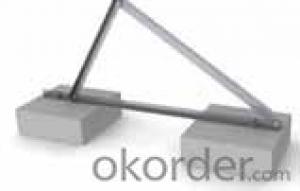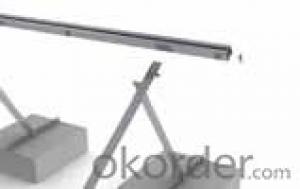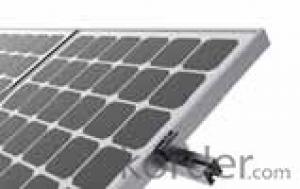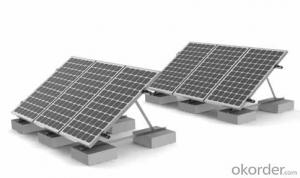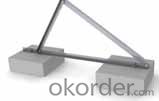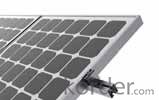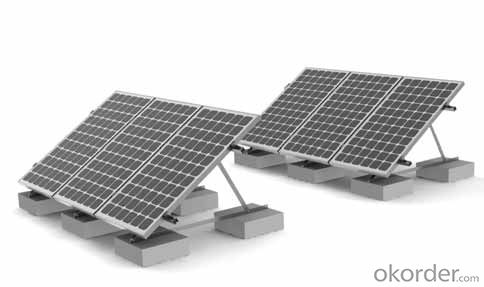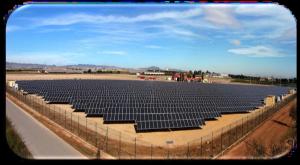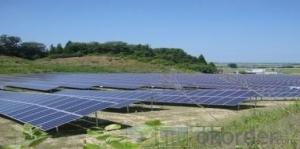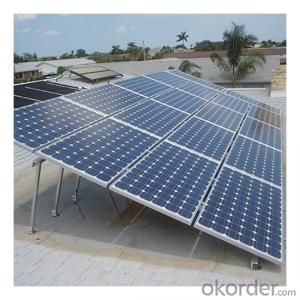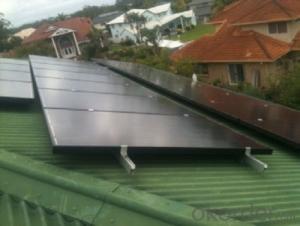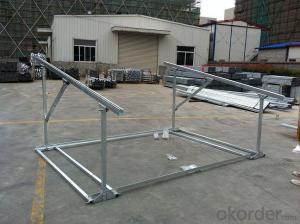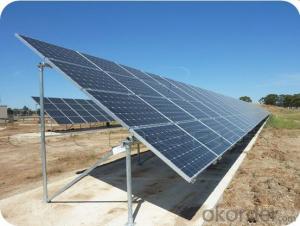Residential Solar Energy Flat Roof System Mounting
- Loading Port:
- China Main Port
- Payment Terms:
- TT OR LC
- Min Order Qty:
- -
- Supply Capability:
- -
OKorder Service Pledge
OKorder Financial Service
You Might Also Like
Product Features
• Adoptable to all kinds of crystalline modules and certain thin film modules.
• Direct foundation bolt , concrete base or bear load are the possible solution for ground installation.
• System installation inclination is adjustable according to requirement.
• Easy installation, only three kinds of tools could finish the installation.
1 Fix the triangular supporting frames
on the concrete base.
2 Fix the rail on the triangular
supporting frames with T-head bolt
and flange nut.
3 Locate the module clamps and put
the PV modules on the rail. Then just
need to fasten the bolt in the clamp.
Flat Roof System
Versolsolar system are being widely used
in all kinds of flat roof according to the
roof bearing capacity and waterproof
requirements. Usually we adopt load
way or chemical anchor bolt to fix the
system on the roof.
Versolsolar chooses high quality material
and good appearance, original design of
connection between al-rail and module
made the installation rapid. No second
processing to the components are
needed on site.
Insrallation site Flat roof
Module specification Frame / frameless module, silicon / film module
Installation inclination Client requirement
Module arrangement Portrait
Module area square Client arrangement
Module area position Client arrangement
Base frame AL 6063T5 / stainless steel
Small pieces Stainless steel, Al6063 T5
- Q: How do solar energy systems impact energy access in developing countries?
- Solar energy systems have a significant positive impact on energy access in developing countries. These systems provide a clean and sustainable source of electricity that is often more affordable and reliable than traditional fossil fuel-based options. By harnessing the abundant sunlight, solar power enables communities to gain access to electricity in remote areas where grid infrastructure is limited. This improves the quality of life by powering homes, schools, and healthcare facilities, while also stimulating economic growth and reducing carbon emissions. Overall, solar energy systems play a crucial role in expanding energy access and promoting sustainable development in developing countries.
- Q: Are there any noise concerns with solar energy systems?
- Yes, there are minimal noise concerns with solar energy systems. Unlike traditional energy sources such as generators or wind turbines, solar panels do not produce any noise while generating electricity. The silent operation of solar panels makes them a preferred choice for residential and commercial installations.
- Q: I want to install a full set of domestic solar heating equipment does not know how much money to spend, please.
- Save 50% equivalent to an annual savings of more than 3300 heating projects; water consumption in accordance with an average of 200 liters a day, remove the winter has been deducted 120 days, the remaining 240 days probably with hot water total: 48 tons, natural gas energy is calculated according to the cost of the cheapest words per ton of hot water heating costs 15 yuan, annual water savings of 720 yuan. Two of the total savings of 4000 yuan, according to the energy prices coefficient is estimated at less than 10 years to recover the full investment, another ten years of savings more than 40 thousand yuan.
- Q: What are the maintenance costs associated with solar energy systems?
- The maintenance costs associated with solar energy systems are generally low compared to other forms of energy generation. Solar panels themselves require very little maintenance as they have no moving parts. However, there are a few key components that may require periodic maintenance or replacement. One of the main maintenance costs is the cleaning of solar panels. Over time, dust, dirt, and debris can accumulate on the surface of the panels, reducing their efficiency. Regular cleaning, typically done with water or a soft brush, helps ensure optimal energy production. Another maintenance cost is the inspection and repair of electrical connections and wiring. These components are essential for converting the sun's energy into usable electricity. Regular inspections can identify any loose connections or damaged wiring that may hinder the system's performance. In addition, inverters, which convert the direct current (DC) generated by the solar panels into alternating current (AC) used in homes and businesses, may need to be replaced after a certain lifespan. Inverter replacement is typically required every 10-15 years, depending on the manufacturer and usage. Overall, the maintenance costs for solar energy systems are relatively minimal compared to the long-term savings and benefits they provide. It is recommended to have a professional solar installer or technician perform regular inspections and maintenance to ensure the system operates efficiently and maximizes its lifespan.
- Q: Can solar energy systems be used in developing countries?
- Yes, solar energy systems can be used in developing countries. In fact, they can be particularly beneficial in these regions due to their affordability, scalability, and ability to provide electricity in remote areas where grid access is limited. Solar energy systems can help address energy poverty, improve healthcare services, enhance education opportunities, and stimulate economic growth, making them a viable and sustainable solution for developing countries.
- Q: Can solar energy systems be used for powering electric car wash systems?
- Yes, solar energy systems can indeed be used to power electric car wash systems. By installing solar panels, the energy from the sun can be harnessed and converted into electricity to power the car wash equipment. This renewable energy source offers an eco-friendly and sustainable alternative to traditional electricity sources.
- Q: Can solar energy systems be used in areas with limited access to solar energy training programs?
- Yes, solar energy systems can be used in areas with limited access to solar energy training programs. While training programs can be beneficial in helping individuals understand how to design, install, and maintain solar energy systems, there are various resources available that can still enable people to harness solar energy even without formal training. Online resources, books, and manuals can provide valuable information on solar energy systems, and local experts or organizations can offer guidance and support. Additionally, some solar energy companies may offer on-the-job training or apprenticeship programs to help individuals acquire the necessary skills. Ultimately, with determination and resourcefulness, individuals in areas with limited access to training programs can still utilize solar energy systems effectively.
- Q: Are there any limitations to using solar energy for powering vehicles?
- Yes, there are limitations to using solar energy for powering vehicles. One major limitation is the dependence on sunlight, which means solar-powered vehicles may not be suitable for regions with limited sunlight or during nighttime. Additionally, solar panels are bulky and require a large surface area to generate enough energy, making it challenging to fit them on small vehicles. The efficiency of solar panels is also affected by factors like dust, dirt, and shading, which can reduce their effectiveness. Furthermore, the cost of solar panels and their storage systems can be relatively high, making the initial investment expensive.
- Q: How much space is needed for installing a solar energy system?
- The amount of space needed for installing a solar energy system depends on various factors such as the size and type of the system, the energy requirements, and the available sunlight. Generally, a small residential solar energy system can be installed on rooftops or in a backyard with an area of about 100-400 square feet, while larger systems for commercial or industrial use may require several acres of land. It is important to conduct a site assessment to determine the suitable space for installation based on individual needs and local conditions.
- Q: Can solar energy systems be integrated with other energy sources?
- Integrating solar energy systems with other energy sources is a widely adopted approach in various applications to guarantee a dependable and steady provision of electricity. Given that solar energy is intermittent and reliant on sunlight availability, combining solar energy systems with alternative sources, such as batteries or the power grid, facilitates the storage of surplus energy generated during sunny periods and enables the provision of electricity during sunlight scarcity. A prevalent method of integration involves the use of hybrid systems, where solar panels are amalgamated with other renewable energy sources like wind or hydroelectric power. This integration allows for a more consistent and reliable energy supply since the different sources can compensate for fluctuations in one another. Moreover, solar energy systems can be integrated with traditional energy sources like natural gas or coal-based power plants. This integration contributes to the reduction of carbon emissions and aids in the shift towards a cleaner and more sustainable energy mix. By combining solar energy with other sources, the overall energy generation capacity is augmented, resulting in a more stable and secure energy supply. In conclusion, integrating solar energy systems with other energy sources is a pragmatic and efficient approach to maximize the advantages of renewable energy while ensuring a continuous and dependable electricity supply.
Send your message to us
Residential Solar Energy Flat Roof System Mounting
- Loading Port:
- China Main Port
- Payment Terms:
- TT OR LC
- Min Order Qty:
- -
- Supply Capability:
- -
OKorder Service Pledge
OKorder Financial Service
Similar products
Hot products
Hot Searches
Related keywords
